- Home
- Troy Denning
Silent Storm: A Master Chief Story Page 22
Silent Storm: A Master Chief Story Read online
Page 22
“It doesn’t matter,” John said. “Maybe the aliens just spotted a prowler visually and wanted to find out why they couldn’t see it on their sensors, or maybe they had a reconnaissance boat watching the rendezvous point before we arrived. What does matter is that they knew what they were seeing—and they were willing to take big risks to capture one.”
“Damn.” Kelly’s gaze went back to the smudges of light on the monitor. “They’re guarding against boarding actions, and they’re trying to capture prowlers. They know the plan.”
“Either that, or . . .” Fred hesitated, then sighed and said, “Okay, they know the plan. How?”
“Maybe they figured it out after Netherop,” Linda suggested. “If the captain managed to report that he was being boarded, they might have guessed we would try it on a larger scale.”
“Possible,” John said. “But that’s a big leap—especially on their own.”
“You think someone helped them figure it out?” Kelly asked.
“That’s a simpler explanation,” John said. “But simplest is that someone told them. General Garvin had to have some pretty decent intelligence to lure the Covenant to a rendezvous. And he must have been able to promise them even more, if he thought he could strike a deal with them.”
“Only one problem with that theory,” Fred said. “Garvin is an innie. How would he get that kind of high-level intelligence?”
“I don’t know,” John said. On the monitor, the two sides were already exchanging fire, the aliens hurling salvos of plasma bolts and the humans countering with missile barrages. And still the Covenant capital ships were holding their fighters close, cocooning themselves inside a picket web so tightly woven that a firefly couldn’t slip past. “But I’m going to find out.”
They continued to watch the monitor as the two fleets tore into each other and the first evacuation ships began to rise out of Biko’s pink clouds and head for orbital transfer stations. The Covenant made no attempt to interfere, perhaps because the number of refugees likely to escape was such a small percentage of the planet’s population. Even the largest passenger liners carried no more than thirty thousand people, and Biko’s total population ran into the tens of millions.
John heard a pair of boots thumping across the deck toward them, then turned to see Avery Johnson approaching in blue light-duty utilities. Other than a brow still lowered in post-concussion pain, he looked healthy and alert enough, and his gait was steady.
“Sergeant Johnson,” John said, “aren’t you supposed to be resting?”
“Depends on who you ask,” Johnson said. “And I was getting bored.”
“Join the club,” Fred said. “How are you feeling?”
“Like I have the worst hangover in history and can’t remember how I got it.” Johnson slipped between Fred and John, then looked around and scowled at the four of them. “So were you all just gonna spend your day lounging around this hangar bellyaching?”
“Just watching the battle from a safe distance,” John said. “And it’s starting to look like that’s all we’re going to do on this mission.”
Johnson leaned close. “And what if it wasn’t?”
John and Fred exchanged frowns; then John asked, “Are you talking outside the chain of command?”
“Not exactly,” Johnson said. “It’s authorized—just quietly.”
“I don’t like it,” Kelly said. “Crowther let us slide on going after the Starry Night without authorization—”
“He did more than let it slide.” Johnson leaned behind John to address Kelly. “He knows you saved our butts with your initiative.”
“Whatever,” Kelly said. “If he finds out we’re going behind his back to do something for Nyeto—”
“It isn’t Nyeto,” Johnson said. “Crowther wants you to volunteer.”
“For what?” John asked.
“Does it matter?”
John glanced up at the bulkhead monitor. The two fleets were close enough now that they had entered evasive maneuvers, filling the darkness with little commas of light as they swerved and bobbed and tried to make themselves unpredictable targets. The Covenant vessels still looked like blue smudges, though they had begun to grow larger and more diffuse as their shells of escort fighters struggled to stay in formation around their motherships. Clearly, even in the middle of a fleet action, the alien commanders were still concerned about being boarded.
John turned to the sergeant. “Yeah,” he said. “It might.”
Johnson looked confused. “I thought Spartans always volunteered.”
“Nasty rumor,” Fred said. “Who knows how those things get started?”
Johnson ignored him and looked at the monitor. “Okay, what am I missing?”
Before answering, John turned his palm up, a signal that the Spartans used to ask each other for permission. Aside from Dr. Halsey, Avery Johnson was probably the one person aboard whom the Spartans could trust. But John’s next decision would affect the entire squad, and the one training weakness that this mission had exposed in him was his lack of political savvy. John knew someone was playing games with the Spartans—he just didn’t know who or why.
When he received nods from the other three members of Blue Team, John caught Johnson’s eye and looked back to the monitor.
“Look at the Covenant fleet,” he said. “You see how hazy their ships are?”
“Sure,” Johnson said. “Their fighters are hanging too close for us to attempt any boarding actions. That’s why Crowther sent me down here.”
“What’s he want?” Kelly asked.
“To send us to Etalan,” Johnson said. “To hit their logistics convoy.”
For a moment, everyone was silent. Finally Fred said, “Sarge, maybe you should listen to your doctor.”
Johnson scowled. “What is it with you people?”
“You’re talking crazy,” Linda said. “The only place the colonel wants to send us is back to Reach.”
Johnson’s eyes lit with understanding. “You’re worried about the argument at the service?”
“Among other things,” John said.
“That was just a cover,” Johnson said. “Crowther wanted to hold you back for this mission.”
“So he threatened to relieve Nyeto of command?” Kelly asked. “Wouldn’t it have been simpler to explain what he was thinking?”
“Not really.” Johnson’s gaze dropped. “There are other issues.”
“We have a few of our own,” John said. “The Spartans aren’t volunteering for anything until you level with us.”
Johnson thought for a moment, then shrugged. “I guess you deserve to know,” he said. “Colonel Crowther didn’t like how long it took Nyeto to respond to your support call on Seoba.”
“Neither did we,” John said. “But he took out two corvettes.”
“The colonel thinks he could have downed the rest by moving quicker.” Johnson paused, then added, “And there’s something else that he just learned. The prisoner transport never made it to Biko.”
“Not surprising at all,” Kelly said. “The Covenant was firing on everything that left Seoba, and Bantas aren’t exactly stealth craft.”
“It wasn’t hit—not even a little bit,” Johnson said. “The Black Widow has her on a combat camera moving to break orbit.”
John began to have a queasy feeling in his stomach. “And the pilots were from Nyeto’s Ghost Flight.”
“You see the problem here,” Johnson said. “It doesn’t mean they were innie spies, or that Nyeto knew about it if they were. But we need to be careful.”
“You think?” Fred shook his head in frustration and turned to John. “Now it all makes sense. Maybe Colonel Crowther is right. Nyeto really took his time supporting us on Seoba.”
“He was using us as bait.” As exasperated as John had been with the slow response during the search for the Starry Night, Nyeto had been nothing but supportive of the Spartans before and since, and it was hard to believe the commander might really be
an insurrectionist spy. “And it worked. He destroyed almost half of the alien flotilla and sent the other two vessels running.”
“John, he’s been trying to get us killed since the capture attempt at Netherop,” Kelly said. “That sensor operator’s open comm was no accident.”
John dropped his chin and said nothing.
He was no JAG investigator, but the evidence against Nyeto seemed pretty flimsy. There were a lot of coincidences that could be explained in a dozen different ways, and it certainly seemed possible that everything being attributed to the commander had actually been done by the missing flight crew on their own. Even the way Nyeto had been forced to reveal the Spartans’ true age could be attributed to simple curiosity and poor social skills.
So there was the possibility that Nyeto was not the traitor that circumstances suggested.
But were the lives of John’s entire squad worth that bet?
After a moment, Johnson asked, “You want it to be Crowther, don’t you?”
“That would be a lot easier, yes,” John said. “And who’s to say sending us to Etalan isn’t a setup as well?”
“Hadn’t thought of that,” Johnson admitted. “Get the Spartans out there alone and eliminate the 21st’s competition. That’s possible, I guess.”
Kelly snorted, Fred shook his head, and Linda rolled her eyes.
A small smile came to Johnson’s face at Blue Team’s collective reaction; then he continued: “But there’s only one way to find out. You have to take the mission.”
“Yeah, I guess so,” John said. “That’s what Spartans are for, right?”
CHAPTER 18
* * *
* * *
Ninth Age of Reclamation
34th Cycle, 64 Units (Covenant Battle Calendar)
Bloodstar Flotilla, Captured Banta-class Transport Emmeline
Libration Point Four, Third moon/Planet Borodan, Kyril System
Perhaps Tel ‘Szatulai would kill the entire ship’s complement later, after his passions had cooled and he could be certain their deaths came at the will of the Prophets and not his own.
Until then—until his jaws stopped grinding and the knot between his hearts loosened—he would stay his hand and learn what had brought the humans to him, why they had risked their vessel and their lives to trail after the Sacred Whisper in a transport as clumsy, poorly armed, and strangely designated as the Emmeline.
‘Szatulai’s two young Jiralhanae escorts were also on edge, shifting back and forth in their new Bloodstar armor as the pressure in the transport’s spacious airlock slowly equalized. The pair were the most assured and cunning of the special pack that ‘Szatulai had assembled to help destroy the hated Spartans, and both were emerging as strong leaders. To prevent them from becoming rivals—a development that would quickly lead to a death match in the brutish Jiralhanae culture—he was taking every opportunity to give them tasks that forced them to look upon each other as brothers-in-arms. Today, he had told them to leave their weapons aboard the Sacred Whisper and accompany him aboard the human vessel, an order that seemed to unsettle both escorts even more than it puzzled them. Finally, Orsun—always the more circumspect of the two—could bear the mystery no longer.
“This is madness, Blademaster.” His voice was booming and certain, even through the transceiver in ‘Szatulai’s helmet. “A ship this size can hold five hundred humans. Even Castor and I cannot defend you from so many without weapons.”
“You Jiralhanae.” ‘Szatulai sissed into his transceiver. “Always being humorous.”
Orsun was silent for a moment, then said, “I was not being humorous, Blademaster.”
‘Szatulai turned around and looked up at the Jiralhanae’s unhelmeted head. With its leathery muzzle and long tusks, it was a ferocious-looking visage, one that could still draw a modicum of fear even from him, who had been assigned to kill twenty-seven of the Brutes over the years.
“Are you not?” ‘Szatulai tried to sound astonished. “So, then, you are trying to insult me?”
“Never!” Orsun said. “I am only wondering how to defend you without weapons.”
“I am a First Blade of the Silent Shadow,” ‘Szatulai said. “I need no defending.”
“Ah.” Orsun sounded more confused than ever. “As you wish, then.”
They stood in silence for a moment; then Castor asked, “Blademaster . . . if we are not here to defend you, then why did you command our presence?”
“To make a point,” ‘Szatulai said. “How would it look if I were to board a human ship alone?”
“No stranger than boarding one without weapons,” Castor said. “But I am honored to accompany you.”
“As long as it doesn’t get you killed?” ‘Szatulai asked.
“That matters not.” Castor’s tone was earnest. “I have set my boots on the Sacred Path, and I will walk where it leads.”
“As will I,” Orsun said. “But I would be much the happier if the Sacred Path does not lead to our deaths.”
‘Szatulai sissed again, this time in genuine amusement. “Not today.” A clunk sounded inside the inner hatch, and he turned to face forward again. “Once we board, stand to your full height, and do not accommodate for their fears—they are not allies.”
“You wish us to appear intimidating?” Orsun asked.
“Imposing,” ‘Szatulai said. “Disdainful and unconcerned. Do not speak to the humans. You may kill one or two, if necessary, but say absolutely nothing to them.”
“As you command, Blademaster.” Castor sounded bewildered but obedient. “It will be done.”
The hatch retracted, revealing a pale-blue passageway containing twelve wide-eyed humans holding projectile guns with long barrels. Their attire was at best nonmilitary, consisting of threadbare pants and shirts with torn-off sleeves. But ‘Szatulai had studied human culture deeply enough to realize that such a sartorial choice was a type of uniform in its own right, a statement proclaiming the wearer to be fiercely independent and unconcerned with the opinions of others. From previous encounters with such types, he knew it meant they would likely be courageous, but undisciplined, poorly trained, and more likely to initiate a battle out of fear or misunderstanding.
Their apparent leader, a square-bodied man with hair to his shoulders and all over his face, spoke in the human language known as English.
“Welcome aboard.” He used his rifle barrel to wave ‘Szatulai and his companions out of the airlock. “General Garvin is waiting for you in the forward briefing compartment.”
‘Szatulai remained in the airlock, his helmet tipped forward to make it clear he was looking at the man’s weapon. The leader followed ‘Szatulai’s gaze and swallowed hard, then flicked something on the body of the gun, lowered it, and turned to his companions.
“Weapons down.”
Only half of the man’s team obeyed instantly, confirming a lack of discipline that would make this visit more hazardous than ‘Szatulai had expected. He had originally debated insisting that the humans come to him aboard the Sacred Whisper, then decided against it. The demand might be interpreted as anxiety, but more importantly, he did not dare to sully the ground of the Covenant’s vessels with the footprints of vermin—that had happened enough as of late.
When ‘Szatulai continued to wait inside the airlock, the leader glared at the holdouts and growled, “Now, people.”
The rest of the man’s team lowered their weapons and stepped back. The leader used his free hand to gesture toward the front of the vessel, and ‘Szatulai led Castor and Orsun out of the airlock. The passageway was large by human standards, but tiny by those of the Jiralhanae. The warriors had to walk single-file behind ‘Szatulai, each filling the space so completely that his armored shoulders scraped both bulkheads and his head kept thumping against the overhead.
At the first two junctions, a handful of slack-jawed humans stood watching as the trio passed, murmuring among themselves and shrinking back from the huge Jiralhanae. ‘Szatulai paid these specta
tors no attention until the third junction, when one raised a device he recognized as a “datapad” and began to record his approach. He could not tolerate such an affront, of course. He was not some harmless oddity being paraded down the passageway for these lowly traitors’ entertainment.
Rather than snatching the item out of the man’s hand—which his fellow humans might regard as merely rude—‘Szatulai waited until he was passing the datapad, then pointed at it. He had barely lowered his hand before Orsun’s fist lashed out to shatter the datapad and send its holder, limp and bloodied, flying into the two humans standing behind him.
A startled outcry arose from the man’s companions. The one leading ‘Szatulai forward abruptly stopped and turned, his weapon automatically rising. ‘Szatulai grabbed the barrel and held it down, then wagged his head back and forth, successfully mimicking a human gesture of warning. Clearly frightened, the man then lowered his weapon again and spoke into a device on his wrist. After that, there were no more gatherings at the junctions, and the procession soon entered a large compartment containing several rows of cushioned chairs, all facing a blank display screen at the far end of the room. Eleven humans were gathered in a large foyer area at the back of the compartment, where a large table had been overturned and an urn of brown liquid spilled on the floor.
The humans were watching each other far more carefully than they were ‘Szatulai and his Jiralhanae escorts. Several held smaller projectile weapons, not quite pointing them at a heavyset man with a large amount of reddish hair on his face, who was standing alone in the aisle between the cushioned chairs. The man’s brow was dripping with perspiration (a curious physiological trait, ‘Szatulai thought) and his eyes were bulging, and in his arms he held an oblong device about the size of a Jiralhanae’s head. At one end of the device, a green panel shined bright.
That was the trouble with traitors. They lacked discipline.
‘Szatulai moved deeper into the compartment, forcing the humans to fall back so that Castor and Orsun would have space, then turned toward a slender man with intelligent eyes and a firm jaw, whom he recognized from the renegades’ holographic message as General Garvin.

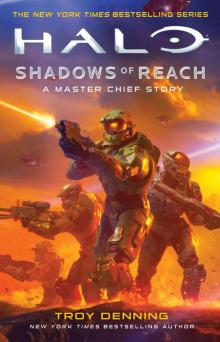 Shadows of Reach: A Master Chief Story
Shadows of Reach: A Master Chief Story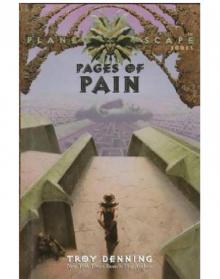 Pages of Pain p-1
Pages of Pain p-1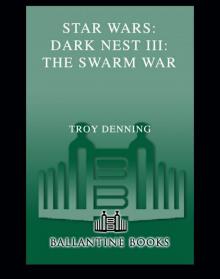 Star Wars 396 - The Dark Nest Trilogy III - The Swarm War
Star Wars 396 - The Dark Nest Trilogy III - The Swarm War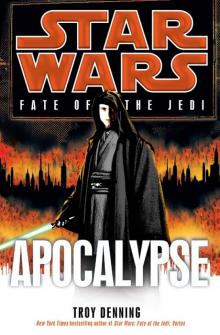 Star Wars: Fate of the Jedi: Apocalypse
Star Wars: Fate of the Jedi: Apocalypse A Forest Apart
A Forest Apart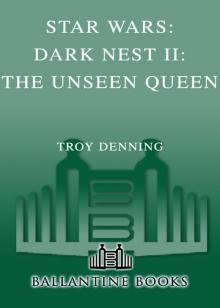 Star Wars: Dark Nest II: The Unseen Queen
Star Wars: Dark Nest II: The Unseen Queen Star Wars: A Forest Apart
Star Wars: A Forest Apart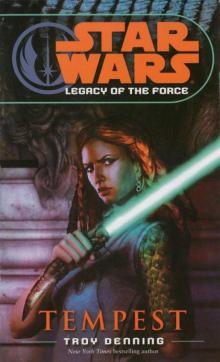 Tempest: Star Wars (Legacy of the Force) (Star Wars: Legacy of the Force)
Tempest: Star Wars (Legacy of the Force) (Star Wars: Legacy of the Force)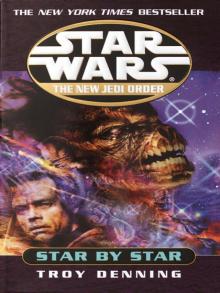 Star by Star
Star by Star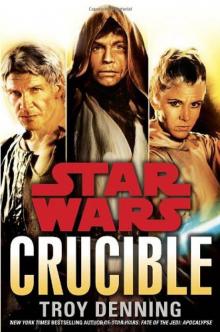 Crucible: Star Wars
Crucible: Star Wars Last Light
Last Light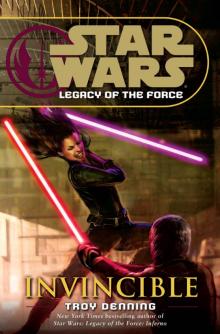 Invincible
Invincible Inferno
Inferno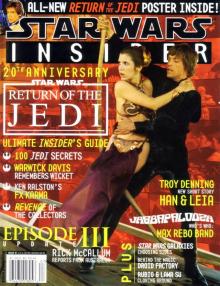 Star Wars - The Trouble With Squibs
Star Wars - The Trouble With Squibs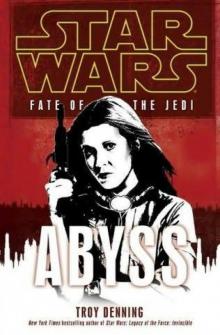 Abyss
Abyss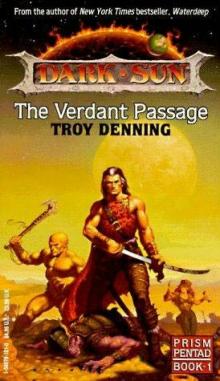 The Verdent Passage
The Verdent Passage Vortex: Star Wars (Fate of the Jedi) (Star Wars: Fate of the Jedi)
Vortex: Star Wars (Fate of the Jedi) (Star Wars: Fate of the Jedi)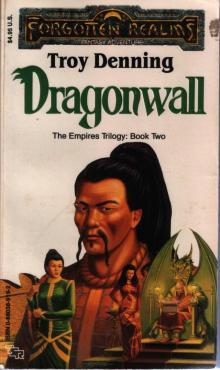 Dragonwall e-2
Dragonwall e-2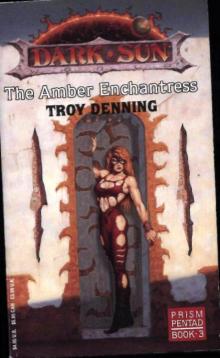 The Amber Enchantress
The Amber Enchantress Crucible
Crucible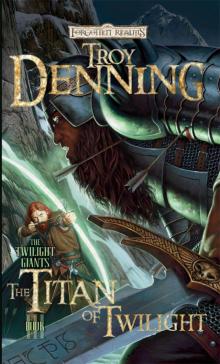 The Titan of Twilight
The Titan of Twilight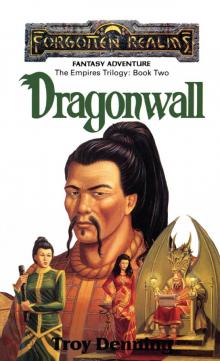 Dragonwall
Dragonwall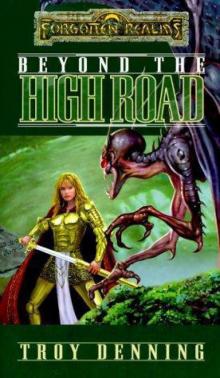 Beyond the High Road c-2
Beyond the High Road c-2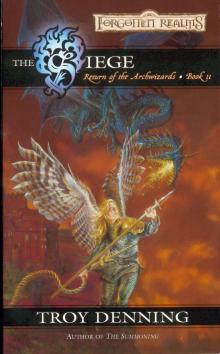 The Siege rota-2
The Siege rota-2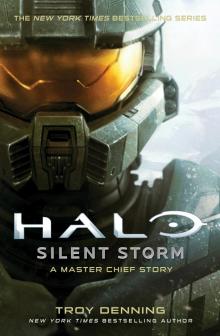 Silent Storm: A Master Chief Story
Silent Storm: A Master Chief Story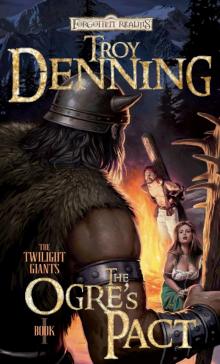 The Ogre's Pact
The Ogre's Pact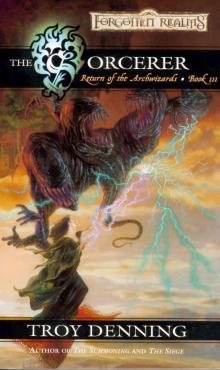 The Sorcerer rota-3
The Sorcerer rota-3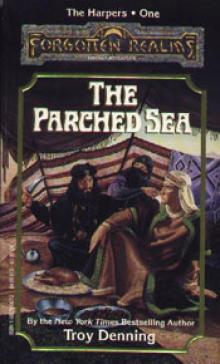 The Parched sea h-1
The Parched sea h-1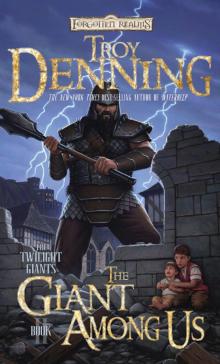 The Giant Among Us
The Giant Among Us Recovery
Recovery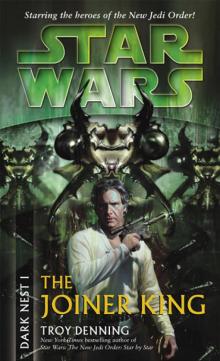 Star Wars: Dark Nest 1: The Joiner King
Star Wars: Dark Nest 1: The Joiner King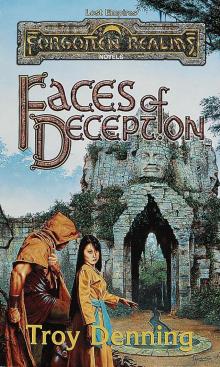 Faces of Deception le-2
Faces of Deception le-2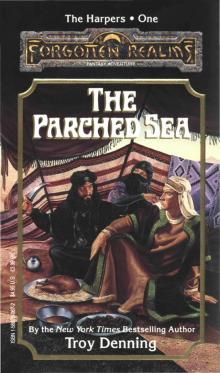 The Parched Sea
The Parched Sea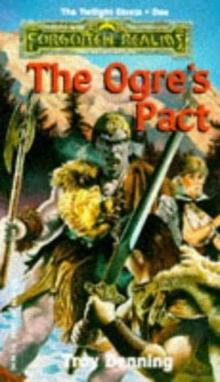 The Ogre's Pact зк-1
The Ogre's Pact зк-1 Apocalypse
Apocalypse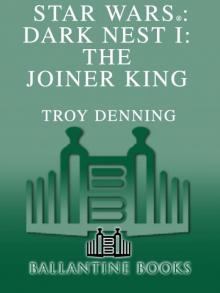 Star Wars®: Dark Nest I: The Joiner King
Star Wars®: Dark Nest I: The Joiner King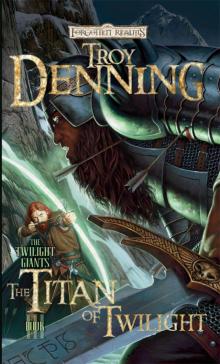 The Titan of Twilight ttg-3
The Titan of Twilight ttg-3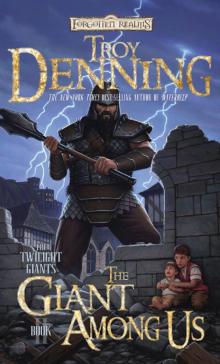 The Giant Among Us ttg-2
The Giant Among Us ttg-2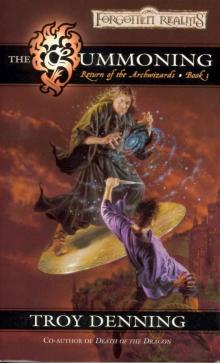 The Summoning rota-1
The Summoning rota-1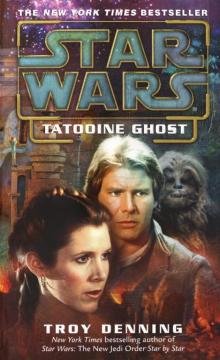 Tatooine Ghost
Tatooine Ghost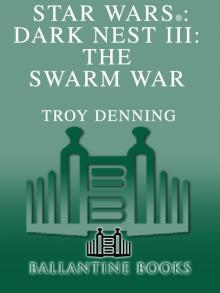 Star Wars®: Dark Nest III: The Swarm War
Star Wars®: Dark Nest III: The Swarm War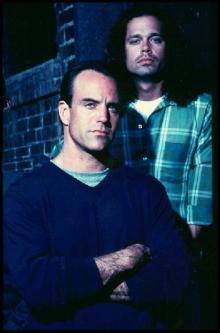 Retribution
Retribution A Forest Apart: Star Wars (Short Story)
A Forest Apart: Star Wars (Short Story)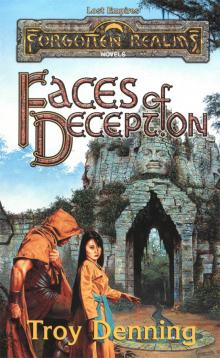 Faces of Deception
Faces of Deception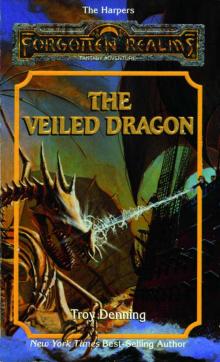 The Veiled Dragon h-12
The Veiled Dragon h-12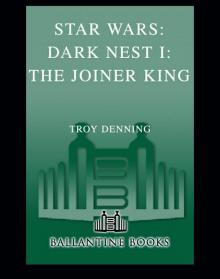 Star Wars 390 - The Dark Nest Trilogy I - The Joiner King
Star Wars 390 - The Dark Nest Trilogy I - The Joiner King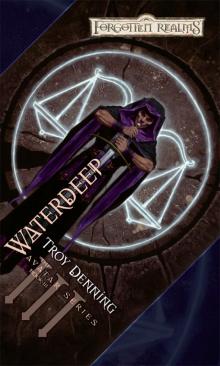 Waterdeep
Waterdeep STAR WARS: NEW JEDI ORDER: RECOVERY
STAR WARS: NEW JEDI ORDER: RECOVERY